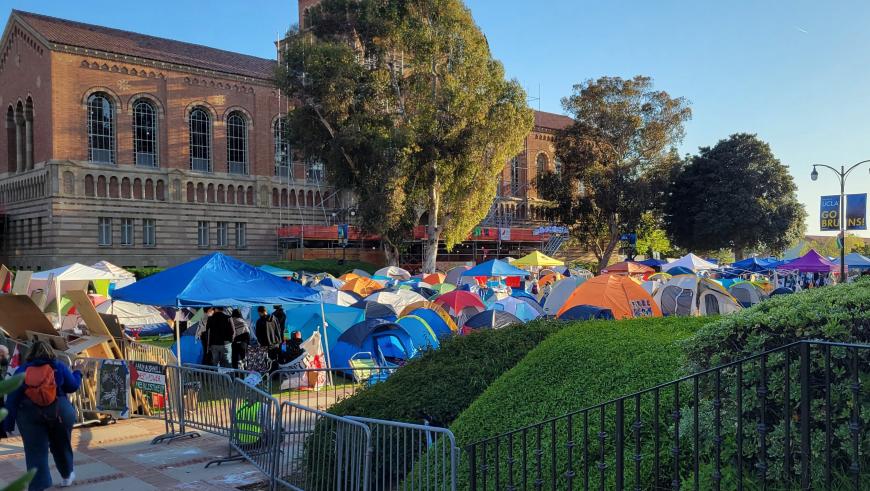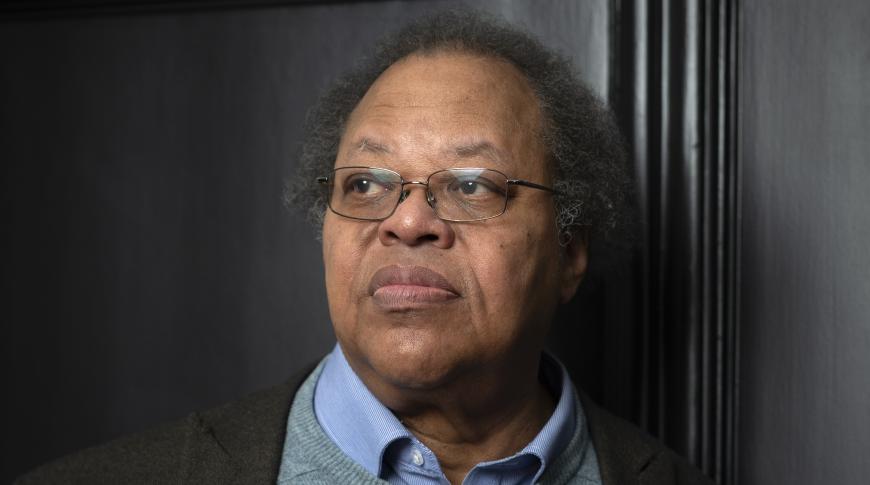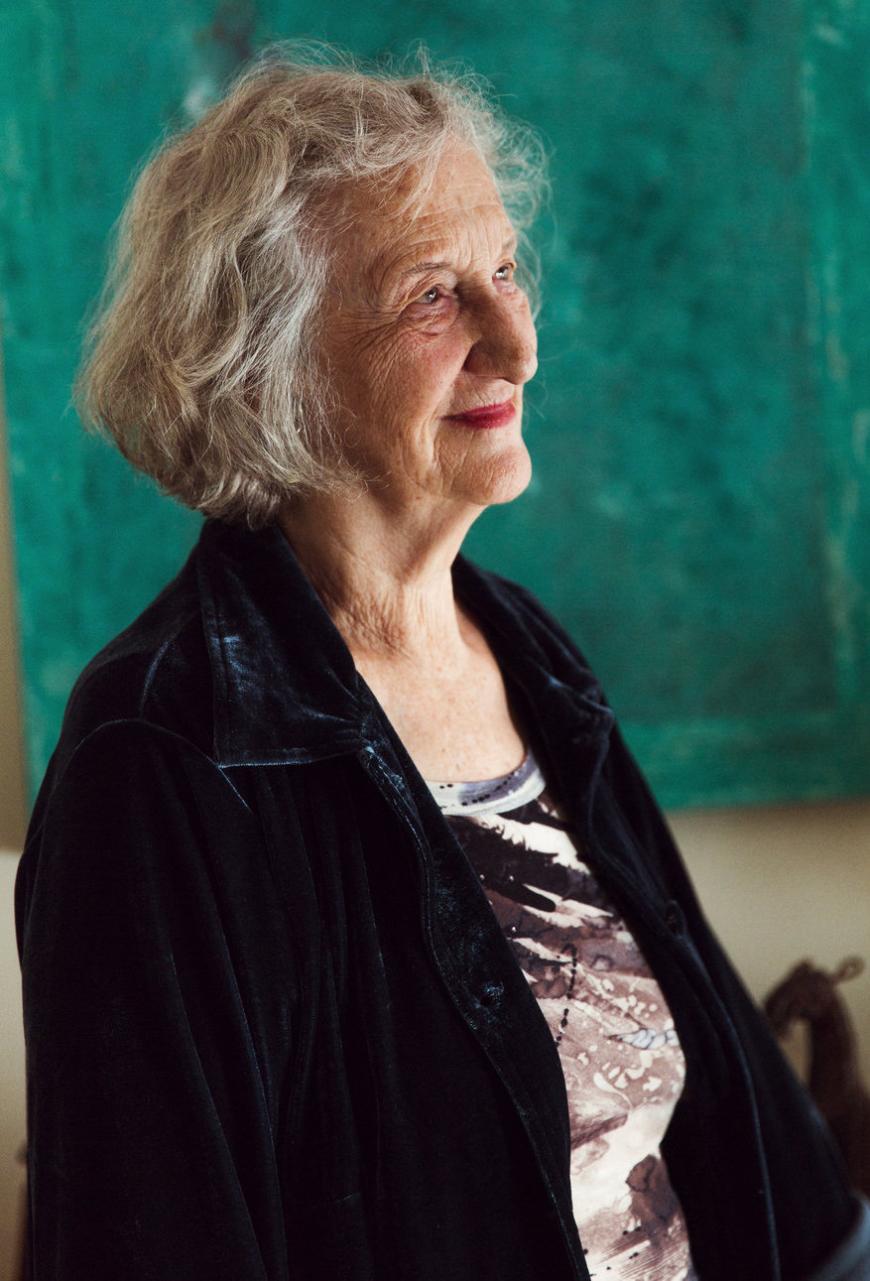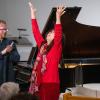
Traditionally, the multiday Hear Now Music Festival climaxes with a full-scale orchestral concert. It did so again on Sunday at UCLA’s Schoenberg Hall, but within an environment charged with controversy.
Arriving in time for the 4 p.m. concert, I found the Westwood campus a live wire of protest. On one side, there were masses of people carrying Palestinian flags, many with their faces covered to avoid face-recognition surveillance. Their base of operations was a tent encampment erected on the quad between Royce Hall and the main library. There were pro-Israel counterprotesters, cadres of police, more college security than I’d ever seen before, and a flock of network news vans. But while the political exchange was definitely heated, no real violence broke out beyond a shrill chorus of opposing bullhorns.
There was one musical fatality, however. “Dear Guest,” a handout flier read, “We regret to inform you that this evening’s presentation of Kronos Quartet Five Decades at Royce Hall has been canceled.”

Inside Schoenberg Hall, however, you would never have known that anything out of the ordinary was going on. Student members of the UCLA Philharmonia filled the stage and were conducted by Director of Orchestra Studies Neal Stulberg, who also served a master of ceremonies for the concert’s livestream.
The program, which featured works by Thea Musgrave, Ella Kaale, Jack Van Zandt, Juhi Bansal, Akari Komura, and George Lewis, concluded the 13th annual Hear Now Music Festival, which encompassed five expansive concerts in three city-spanning locations April 24–28.
In keeping with Hear Now’s prime directive, the programs highlighted work by contemporary Los Angeles-based composers — 29 pieces in all, including nine world premieres. The instrumental participants included members of Brightwork Ensemble, the vocal ensemble HEX, People Inside Electronics, the Lyris Quartet, International Contemporary Ensemble (ICE), and UCLA students. Hear Now’s founder and director, Hugh Levick, again curated the festival.

The featured composer on Sunday’s concert was Lewis, ICE’s artistic director and a professor in the music department at Columbia University, though he’s currently enjoying the early days of a sabbatical that will soon have him headed for an extended stay in Paris.
Lewis’s contribution to the program was the Los Angeles premiere of his 2019 double concerto Lonnie and Lonie, inspired by his muscle-car loving twin uncles. Their contrasting personalities were given voice by Glen Whitehead on trumpet and Susan Grace on piano. The piano part incorporates a spectral modernist vocabulary, while the trumpet introduces more of the ebbing and flowing style of free jazz. Here and there, the piece swings in a nod to Duke Ellington, or a juxtaposition of explosive fusillades and soft muted colorations evokes Miles Davis. In contrast, the orchestra’s contributions share more with the total serialism of Pierre Boulez.
The orchestration is dense and often thorny, with unpredictable shifts in rhythms and dissonance. Both soloists gave standout performances, while the young musicians of the orchestra, guided by Stulberg, made Lewis’s complexities move with the agility of the uncles’ muscle cars — Lonnie’s Dodge Charger and Lonie’s Chevy Camaro.

To quote the Bard, “Age cannot wither her, nor custom stale her infinite variety.” This in reference to the 95-year-old Musgrave, whose Orfeo V received its world premiere to open Sunday’s concert. It’s a piece that Musgrave has reconfigured and tinkered with since its first incarnation was performed by flutist James Galway in 1976. Originally for flute and tape, the work was expanded to include strings and, on Sunday, a second flute. The voice of Orfeo was illuminated by J.R. Santiago, the voice of his lost love, Euridice, by Katlyn Lang.
Songs of water and the sea provided a connecting thread through much of the concert. Kaale’s seawall blvd, premiered last year at the USC Thornton School, where the composer is an undergraduate student, combined atmospheric seascapes reminiscent of Benjamin Britten’s Peter Grimes with a flock of screeching seagulls worthy of Alfred Hitchcock’s The Birds.
Of her 2022 composition Songs From the Deep, Juhi Bansal observes, “Jacques Cousteau wrote of finding freedom below the ocean’s surface. … Below the waves lies a world that is both surreal and familiar.” This is a realm of reflections and currents and distant whale song that Bansal depicts with an engrossing spectrum of orchestral coloration and effects.
Van Zandt, who was once a student of Musgrave’s, turned to British literature for his From th’ Ethereal Skie, which he describes as “an imaginary ballet inspired after John Milton.” With Milton at its root, the “ballet” presents the orchestral encounter between Satan (aka the serpent) and his seduction of poor naive Eve. It does not end well.
From the depths of the sea to the plains of paradise, the concert moved into the meditative realm of a sound bath with a performance of Komura’s Inhabited by Air. From inaudible string passages and long, deep exhales, the piece gradually builds to a crescendo of extended effects, the strings used as wooden percussion instruments. The goal, says the composer, currently pursuing a Ph.D. at UC San Diego, is to encourage the audience to experience the vocabulary of music in new and exciting ways.
And after all, isn’t that what Hear Now is all about?




